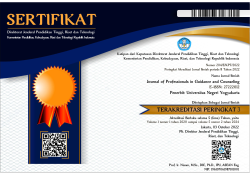The effect of learning interest and self-efficacy on junior high school students' learning achievement
Downloads
Downloads
Alwisol. (2012). Psikologi kepribadian. (Edisi Revisi). Malang: Umm Press.
Bandura, A. (1997). Self efficacy – the exercise of control. (Fifth Printing, 2002). New York: W.H. Freeman & Company.
Basith, A., Syahputra, A., & Ichwanto, M. A. (2020). Academic self-efficacy as predictor of academic achievement. JPI (Jurnal Pendidikan Indonesia), 9(1), 163-170.
Dewantoro, J. E., Sulistyarini, S., & Rosyid, R. (2020). Pengaruh minat belajar dan efikasi diri terhadap hasil belajar ekonomi SMA Negeri 2 Pontianak. Jurnal Pendidikan dan Pembelajaran Khatulistiwa, 9(7).
Djaali. (2008). Psikologi Pendidikan. Jakarta: Bumi Aksara.
Ermannudin. (2021). Pengaruh efikasi diri terhadap prestasi belajar siswa kelas XI IPS pada mata pelajaran ekonomi di SMAN 7 Kerinci. Jurnal Ilmiah Dikdaya, 11 (2), 201-214.
Fadilah, R. N., & Rafsanjani, M. A. (2021). Pengaruh efikasi diri siswa terhadap hasil belajar ekonomi dalam pembelajaran daring. Jurnal Paradigma Ekonomika, 16(3), 581-588.
Feist & Feist. (2011). Teori kepribadian Jilid 2. Jakarta: Salemba Humanika.
Hidayat, D. R. (2011). Psikologi kepribadian dalam konseling. Bogor: Ghalia Indonesia.
Hindayani, K., Khosmas, F. Y., & Syahrudin, H. (2019). Pengaruh efikasi diri terhadap prestasi belajar ekonomi siswa kelas XI SMA Negeri 5 Pontianak. Jurnal Pendidikan dan Pembelajaran Khatulistiwa, 8(9).
Hosnan. (2016). Pendekatan saintifik dan konstektual dalam pembelajaran abad 21. Bogor: Penerbit Ghalia Indonesia.
Husna, R., & Budiman, B. (2018). Pengaruh self efficacy terhadap hasil belajar matematika siswa di kelas X SMK SMTI Banda Aceh. Jurnal Ilmiah Mahasiswa Pendidikan Matematika, 3(2).
Ismayanti, W., Santosa, C. A. H. F., & Rafianti, I. (2022). Minat belajar, efikasi diri, dan kemampuan berpikir kritis berpengaruh terhadap hasil belajar matematika siswa. Jurnal Educatio FKIP UNMA, 8(3), 943-952.
Kpolovie, P. J., Joe, A. I., & Okoto, T. (2014). Academic achievement prediction: Role of interest in learning and attitude towards school. International Journal of Humanities Social Sciences and Education (IJHSSE), 1(11), 73-100.
Lee, Y. J., Chao, C. H., & Chen, C. Y. (2011). The influences of interest in learning and learning hours on learning outcomes of vocational college students in Taiwan: using a teacher's instructional attitude as the moderator. Global journal of engineering education, 13(3), 140-153.
Manzano-Sanchez, H., Outley, C., Gonzalez, J. E., & Matarrita-Cascante, D. (2018). The influence of self-efficacy beliefs in the academic performance of Latina/o students in the United States: A systematic literature review. Hispanic Journal of Behavioral Sciences, 40(2), 176-209.
Syah, M. (2010). Psikologi pendidikan dengan pendekatan baru. Bandung:PT Remaja Rosdakarya.
Nasir, M., & Iqbal, S. (2019). Academic self efficacy as a predictor of academic achievement of students in pre service teacher training programs. Bulletin of Education and Research, 41(1), 33-42.
Ningsih, W. F., & Hayati, I. R. (2020). Dampak efikasi diri terhadap proses & hasil belajar matematika (the impact of self-efficacy on mathematics learning processes and outcomes). Journal on Teacher Education, 1(2), 26-32.
Pratama, D. Y. (2020). Pengaruh minat belajar dan efikasi diri terhadap hasil belajar siswa (study pada mata pelajaran kearsipan kelas X SMK PGRI Turen). Doctoral dissertation, Universitas Negeri Malang).
Putri, L. A., Rahman, K. A., & Rahmalia, R. (2021). Pengaruh minat belajar dan efikasi diri terhadap prestasi belajar siswa kelas XI manajemen perkantoran di SMKN 1 Kota Jambi. Doctoral dissertation, Universitas Jambi.
Rohim, A. (2011). Pengaruh minat belajar terhadap prestasi belajar siswa pada bidang studi PAI. Skripsi. UIN Syarif Hidayatullah.
Rusmiati, R. (2017). Pengaruh minat belajar terhadap prestasi belajar bidang studi ekonomi siswa MA AL FATTAH Sumbermulyo. Utility: Jurnal Ilmiah Pendidikan dan Ekonomi, 1(1), 21-36.
Sihaloho, L. (2018). Pengaruh efikasi diri (self efficacy) terhadap hasil belajar ekonomi siswa kelas XI IPS SMA Negeri Se-Kota Bandung. JINoP (Jurnal Inovasi Pembelajaran), 4(1), 62-70.
Sudjana, N. (2013). Dasar-dasar proses belajar mengajar. Bandung: Sinar Baru Algensindo.
Suryabrata, S. (2006). Metodologi penelitian. Jakarta: Raja Grafindo Persada.
Umbara, F. D. A. D., & Sudihartinih, E. (2020). Hasil belajar dan efikasi diri siswa sekolah menengah pertama pada mata pelajaran matematika. Sigma, 6(1), 8-16.
Usman, M. U. (2013). Menjadi guru profesional. Bandung: PT. Remaja Rosdakarya.
Zheng, B., Chang, C., Lin, C. H., & Zhang, Y. (2021). Self-efficacy, academic motivation, and self-regulation: how do they predict academic achievement for medical students?. Medical Science Educator, 31, 125-130.
 | ProGCouns: Professional Guidance and Counseling Journal is licensed under a Creative Commons Attribution-ShareAlike 4.0 International License. |















